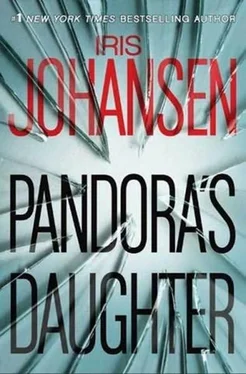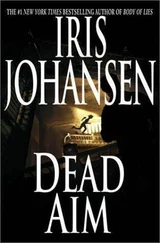"No, he'll do that tomorrow. Right now there's no change in his condition. They're to contact both of us if there's any alteration, good or bad, tonight. Tomorrow you can talk directly to Gardner. He gave me his number and told me he's available to the families of his patients at any time."
"He sounds like a good doctor, a good man." She paused. "Thank you." It was clever of Grady to soften her attitude by appealing to her affection for the one person that they could discuss without conflict. "I just didn't think they were going to move him until tomorrow."
"I wanted him more comfortably settled."
"So that you could check him off your priority list?"
"No." He stared her in the eye. "So you could check him off yours. Yes, I wanted him to have the best possible care, but I also wanted your mind and focus clear. If that makes me a bastard, then so be it." He poured coffee into her cup. "But I don't believe my selfishness is that important to you at the moment or I wouldn't be here. Your move, Megan. Why did you want to talk to me?"
"Because you're the one with the answers." Her hands clenched around her cup. "I need to know more."
"More than what?"
She took a folded page of paper from her pocket and handed it to him. "When I was in the cave, these were the only conversations that I could distinguish out of that hideous cacophony. They were the strongest echoes."
"And?"
"I had to know that what you told me was true." She shook her head. "No, there's no way I can know, but I had to believe." She drew a deep breath. "That's why I spent the last sixteen hours at the computer searching through newspaper morgues trying to find some rock of reason to cling to."
"And did you find it?"
She didn't answer directly. "It wasn't easy. I had no date factor to enter into the equations. I had to go through every reference to the quarry since 1913, when the newspaper was established. I wasn't even sure what happened there would be mentioned. If there were crimes, they might not be known. If the emotional trauma was personal, there was no reason for it to be in the newspapers."
"No reason at all." His gaze narrowed on her face. "But you did find something. You're… pumped." He tapped the first name on the paper she had given him. "Hiram?"
"In 1922, Hiram Ludlow, a worker at the quarry was tried for the murder of his wife, Joanna. He pushed her from the cliff only a few yards from the cave. Then he went after his brother, Caleb, and shot him. He died in prison in 1935."
Grady pointed at the second name on the paper, "Pearsall."
"In 1944, Kitty Brandell sued Donald Pearsall for child support for her illegitimate daughter. She worked in the Pearsall Carpet Factory near town and when Donald came back from serving in the Army in World War Two, he evidently swept her off her feet. They had several clandestine meetings in the cave that summer and her daughter, Gail, was conceived there. He denied being the father and she was fired from her job and practically run out of town. But she fought back, saved up money for a lawyer, and filed the suit when her daughter was seven years old."
"Did she win?"
"No. His family had the power and the money. She ended up with nothing but court costs and a bad reputation, which was pretty terrible in those days. I wanted to find what happened to her later, but I didn't have time to investigate anything that wasn't pertinent to what happened in that cave."
He glanced down at the third name. "What about baby John?"
She shook her head. "I couldn't find anything in the newspapers. Maybe nothing violent happened to him at the cave. Maybe his mother just ran up there like a wounded animal when her baby, John, died or was hurt. There's nothing more wrenching than a mother who's lost her child."
Grady put a question mark beside baby John. "Two out of three. Not bad."
"Not bad? It's terrible. It's all terrible." She held up her hand as he opened his lips to speak. "Yes, I know you were talking about my so-called success ratio. But I just can't separate the voices and what they went through to cause that agony. I can't stop my own pain. It's as if I absorb it and can't let it go. Did Phillip's wife ever succeed in doing that?"
He nodded. "But she never felt the intensity of emotion that you do. Nora was never able to separate the voices. They were just one tidal wave of sound to her, like the howling of the inmates in Bedlam. I think it's like that with most Listeners."
"Then how did I get so lucky?" she asked bitterly.
He looked down into his cup. "Your particular talent may have other facets." He changed the subject. "You didn't answer my question. You were looking for a rock to cling to, some proof that could convince you. Did you find it?"
"It could all be pure guesswork, coincidence."
He repeated. "Did you find it, Megan? Do you believe me? Do you believe in what you are?"
She didn't answer for a moment. She didn't want to say the words. To make that final admission would be to change everything; her past, her present, her future. She would never be able to look at herself in the same way again.
"Pretty scary? If it will help, you won't have to face it alone. I'll be here for you."
"I don't want your help." It wasn't the truth. She wanted all the help she could get, but she couldn't take it. "I am what I am. I'm the one who has to handle any problems."
"And exactly what are you, Megan?" he asked softly. "Say it."
"I'm a fairly intelligent woman and a doctor."
"And?"
She hesitated and then haltingly said the words, "I'm a Listener, dammit."
He smiled. "At last."
"But I'm not Nora and I will not be dependent on you as she was."
"That thought did occur to me after I had to chase you down when you decided you had to face your demons instead of being traumatized as most people would have been. I don't believe 'dependent' could ever be included in you character description."
She had stopped listening after that first sentence. "Demons," she repeated. "You said that before. But I can't think of the voices as demons if I have to live with them. They have to be people. Bad people, good people, selfish, generous, helpless, powerful, but human. Always human. If I have to deal with demons, then my life would truly be hell."
"My God."
"What?"
"You're already molding, defining, fashioning the situation to suit yourself."
"I'm trying to survive. I will survive."
"I'm sure you will." He took another drink of his coffee. "But you didn't invite me here to watch you struggle with your gift. You said you needed answers."
"I have an orderly mind. I had to take one problem at a time."
"You've obviously leapfrogged over the first one. Give me the questions."
Leapfrogged? She was still moving as sluggish as a turtle in accepting that damn Listener concept. Yet she had accepted it and now had to move on. "You said my mother was killed by a man named Molino. A revenge killing. Why?"
"He blamed her for killing his son, Steven. Molino is the slime of the earth, but he did love his son. He was proud of him and considered him a chip off the old block and he was probably right. From what I could gather, the boy was a liar, a sadist, and a rapist. All qualities that Molino shared."
"And he thought my mother killed his son?" She shook her head. "He was wrong."
"It depends on how you look at it."
"No, it doesn't. She was kind and gentle."
"Yes, but kind and gentle people do kill in self-defense."
"Why would she have to defend herself? Who the hell is Molino?"
"Scum. He dips his hands in quite a few cesspools. He's a drug dealer, owns a chain of whorehouses in Africa and South America and he dabbles in child slavery."
"What?"
"He pays bandits to steal children from the villages in Africa and handles the kidnappings in the U.S. and Europe himself. He sells them to clients all over the world. It's a very lucrative trade. Many tribal men in Africa believe breaking a virgin will rid them of AIDS."
Читать дальше












